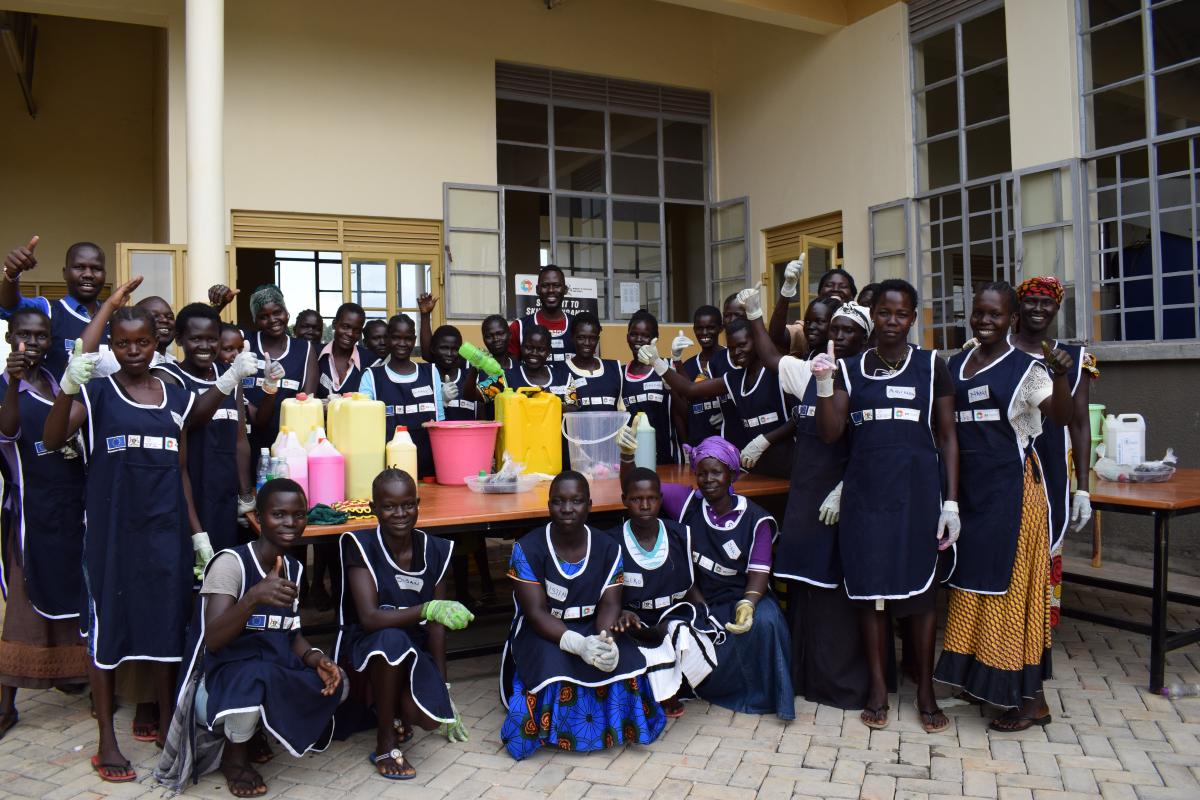Skills training and livelihood interventions transforming lives of refugees: a tale of three women.
A mere thought of her journey from South Sudan to Uganda boarder brings
tears to her eyes, as 23-year old Nancy Maneno cuddles on to her six-month old
baby. She soaks in more tears while reminiscing of the attack on her family
during the war. “When the war broke out, my three children and I stayed in the bush for days
with no food or medication. Coming to such a peaceful environment in Uganda is like a miracle,” she narrates.
27-year old
Betty Ekisa came to Bidi-Bidi refugee settlement in August 2016 after her
home was attacked by rebels in South Sudan. She walked for two days with her
husband and four children to the Ugandan boarder, where they were later
transferred to the settlement.
Taken up by emotions,
Betty says: “Life has not been easy in terms of generating income to meet household
basic needs.”
"My life is changing. I am now busy making soap for my household and business,” Josephine reveals. Josephine is
the treasurer of Manjoora women’s group comprised of thirty women to which Betty
and Nancy belong and is supported by Community Empowerment for Rural
Development (CEFORD).
These three women
have one thing in common; despite being victims of the South Sudanese war, they
have put their tragic tales aside to work and support each other for
self-reliance.
In support of
the group, the Belgian development agency organised the training in soap making through 'instant skills
training' using the voucher scheme. The agency innovatively set up a voucher scheme to provide qualitative ‘instant training’ responding
to skills gap of beneficiaries in collaboration with other agencies supporting
livelihood and income generating activities of refugees and host communities.
Testimony
Manjoora
women’s group is found in Zone 1 of Bidi-Bidi refugee settlement, the second largest settlement in the world hosting at least 270,000 refugees.
The group was formed by CEFORD,
a community empowerment organisation for livelihoods working under the
consortium led by Danish Refugee Council (DRC) and were trained in livelihood
actions based on the participatory driven Enabling Rural Innovations (ERI)/
Participatory Action and Enterprise Development (PAED).
The group has thirty members, all women, who meet twice a week to make soap, hand crafts
and share
learning experiences about their nutritional back-yard gardens to better their
livelihoods.
As part of
collaborative efforts between livelihood and sustainable development
interventions, the Belgian development agency has trained the women through a
pilot instant skills training voucher scheme. The goal is to enhance livelihood
and labor market relevant skills for youth, women and girls of the refugees
through short term vocational training and entrepreneurship support.
Group members such as
Nancy, Betty and Josephine who were forced to drop out of school, now have gained
skills in soap making for subsistence and income generation. This will empower
them to set up small businesses for income generation.
As a result of
the instant training, Manjoora women’s group have planned to specialize in soap
making business for their zone in Bidi-Bidi refugee settlement and empower
fellow women outside their group for financial stability.
86% of the
refugee population in Uganda are women and children under 18 years who deserve
a right to access basic needs for better livelihoods.
Funded by the
European Union Trust Fund, the SPRS-NU programme combines interventions of
livelihood, income generation, thereby addressing humanitarian concerns through
a sustainable development approach.
Latest news from this project
No news

